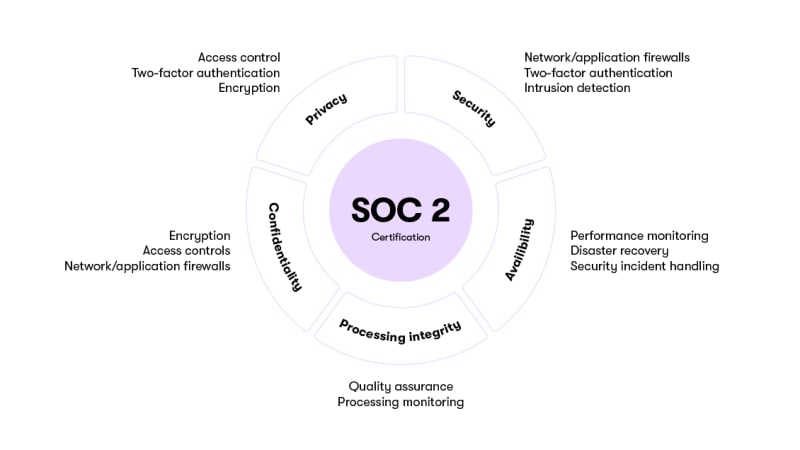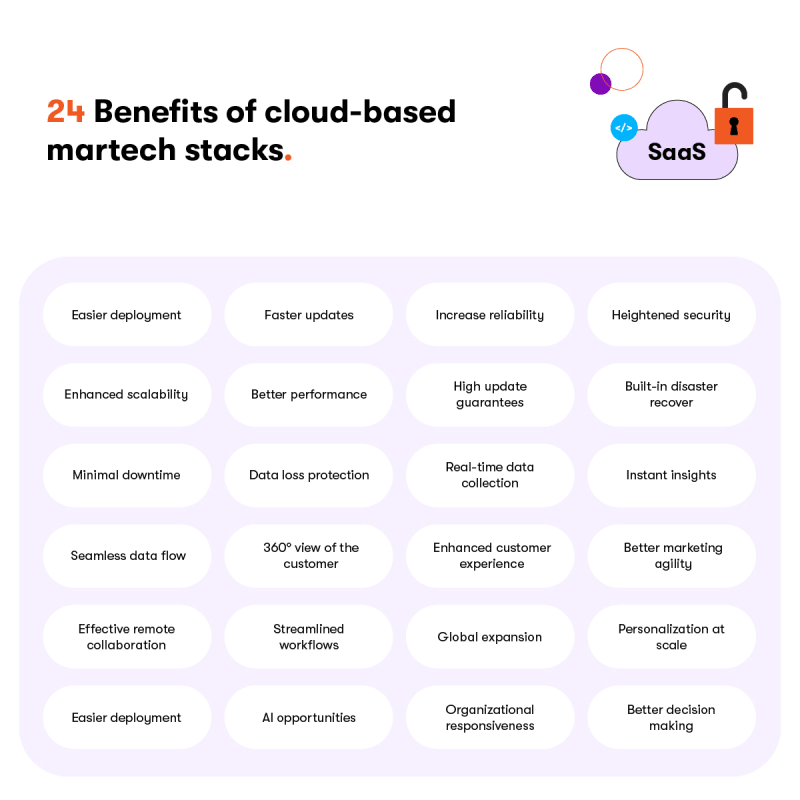Discover industry experts' insights on the marketing opportunities and pitfalls of a cloud-based marketing technology (martech) stack. From infrastructure and insights to innovation, the discussion offers a lively and diverse exploration of how cloud solutions can transform marketing strategies.
As organizations strive to meet the demands of today's digitally empowered consumers, the role of technology in driving marketing success has never been more critical. To shed light on this evolving landscape, we've reached out to industry experts to gather their insights on one of the most transformative trends in marketing technology: cloud-based martech stacks.
Join us as we delve into the insights of industry leaders, as we ask them: What key opportunities does cloud deployment bring to marketing teams?
1. Service quality
“The most significant opportunities for marketing teams deploying in the cloud include increased reliability, security, scalability, and performance.” Brian McKeiver, Co-Owner at Bizstream.
Cloud services usually offer strong infrastructure with high uptime guarantees as well as built-in disaster recovery options that protect against data loss and minimize downtime. They also allow for on-demand resource scaling, supporting campaign growth, traffic spikes, and market expansion without significant upfront investment.
Additionally, cloud providers implement advanced security measures, including encryption, firewalls, and access controls, to protect sensitive marketing data. Many cloud services also comply with industry standards and regulations, such as GDPR and CCPA, helping businesses meet legal requirements and safeguard customer information.

“More surprising benefits of cloud platforms are that they can provide immediate data analysis and insights, enhance remote collaboration, and easily exchange information with other platforms and innovations. All these factors become essential for agile decision-making for marketing teams.”
Brian hits the nail on the head here, and his thoughts are echoed by our other experts below.
2. Instant insights

“If data is not in the cloud, it is going to be progressively more difficult to a) tap into that data and b) leverage combined data streams to optimize the user experience of your platform. If you as a marketer take your business seriously and are actively working on improving business results from a data-driven futureproof point of view, cloud is the way to go.”
Cloud-based data solutions play a crucial role in enhancing customer experiences. They allow for real-time data collection, providing immediate insights into customer behavior and preferences.This enables marketers to quickly adjust campaigns, personalize content, and respond to customer needs as they arise.
Seamless data flow between various tools (e.g., CRM, social media, email marketing) gives marketers a 360° view of the customer and their journey, enabling them to deliver more targeted, consistent, and cohesive customer experience across channels
3. Tighter teamwork

“Collaboration is also significantly enhanced with cloud-based tools, which facilitate seamless teamwork, allowing staff to work together effectively on projects regardless of location. This is especially vital for global teams, ensuring consistency and efficiency across different regions.”
Machine learning algorithms can analyze customer data to uncover deep insights into customer behavior, preferences, and purchasing patterns. This understanding helps in creating highly personalized marketing campaigns. AI-driven predictive analytics can analyze vast amounts of data to forecast trends and predict customer behaviors. This allows marketers to anticipate customer needs and preferences, enabling proactive strategies rather than reactive ones.
Of course, AI-powered tools can automate various aspects of campaign management too, from initial setup to ongoing optimization and can optimize resource allocation by identifying the most effective channels and strategies.
4. Boundless opportunities

“The cloud extends the reach of marketing efforts globally. Teams can implement personalized customer experiences at scale, tailoring campaigns to diverse audiences and demographics with ease. By leveraging cloud-based martech, they transcend geographical boundaries, amplifying their global presence and engaging diverse audiences with targeted precision.”
The cloud enables marketing teams to extend their efforts to target and engage audiences worldwide, vastly expanding their market potential. By leveraging cloud-based martech, businesses can operate seamlessly across different regions, tailoring their campaigns to fit local cultures, languages, and preferences, while ensuring that marketing messages are appropriate, relevant, and engaging. And they can do it at scale. So, even as the target audience grows, the quality and relevance of the marketing efforts can be maintained.
5. No more sleepless nights

“The simple answer? Peace of mind. Deploying new changes shouldn't be a 4-hour, middle-of-the-night effort. With cloud-based deployment strategies, those once scary and sleepless nights are a thing of the past.”
Teams no longer need to work through the night or lose sleep over potential issues disrupting operations. Cloud-based deployment strategies streamline the process of implementing new changes, making it straightforward and hassle-free. Deploying changes in the cloud also significantly reduces the time required for implementation. What once took several hours can now be accomplished quickly and efficiently. By automating and optimizing deployment processes, cloud-based solutions enhance overall operational efficiency and contribute to a more agile and responsive organization, capable of adapting to changes quickly and effectively.
Why isn’t everyone running to the cloud?
Adopting a cloud-based martech stack can indeed revolutionize marketing operations, offering unparalleled flexibility, scalability, and innovation. However, not every organization is ready to make the leap to the cloud. Despite its many advantages, there are legitimate concerns that companies must address before fully committing to a cloud deployment. Understanding these concerns is crucial for making an informed decision and ensuring a smooth transition.
Regulatory compliance: Stringent regulatory requirements may pose challenges for cloud deployment. Look for cloud solutions with built-in compliance features and certifications that align with industry regulations. Ensure transparency in data handling and robust controls for data sovereignty.
Security considerations: Concerns about data security and control may deter organizations from adopting cloud solutions. Evaluate cloud providers with robust security measures, including encryption, access controls, and compliance certifications. Look for SOC2 Type 2 certification.

Cost efficiency: While the pay-as-you-go model seems cost-effective initially, long-term costs can escalate. Choose cloud solutions with transparent pricing models and cost optimization tools to monitor and control expenses.

“The cloud is a double-edged sword. The simplicity of its activation can easily be a source of cost for subscriptions that are never really in use. But if used well, it can provide an unparalleled level of flexibility that will ultimately be appreciated by the company's digital audience.”
Performance and reliability: Performance issues and reliability concerns may arise, especially in areas with limited internet connectivity. Prioritize cloud providers with robust network infrastructure and global presence to ensure low latency and high availability.
Customization and control: Highly customized marketing operations may not be fully supported by off-the-shelf cloud solutions. Seek cloud providers offering flexible and customizable solutions, including APIs and SDKs for integration and extensibility.
Organizational readiness: Lack of skills and expertise may hinder effective management of cloud infrastructure. Invest in training and upskilling initiatives for IT teams to build proficiency in cloud technologies. Leverage managed services and partnerships with cloud providers to supplement internal capabilities and ensure smooth transition and ongoing management.
Mitigating vendor lock-in: Dependence on a single cloud provider may restrict flexibility and increase switching costs. Adopt cloud-agnostic architectures and standards-compliant solutions to minimize vendor lock-in. Prioritize interoperability and portability of workloads across multiple cloud platforms, enabling seamless migration and reducing dependency on any single provider.
By considering these cautionary points and looking for specific features and capabilities in cloud solutions, organizations can mitigate risks and reap the benefits of cloud-based martech stacks effectively.

The opportunity in cloud martech
Cloud-based martech stacks present a wealth of opportunities for innovation, agility, and efficiency. And while the decision to make the shift is not without its challenges, the cloud offers marketing teams the tools to stay ahead in a rapidly evolving digital landscape.
Embracing cloud-based martech solutions can transform marketing operations, enabling teams to deliver personalized, data-driven campaigns with unprecedented efficiency and reach. Are you ready to elevate your marketing game?
Subscribe to the Kentico Xperience newsletter
You'll receive our newsletter once a month with all the updates you need to know to keep you in the loop with the Kentico Xperience community. Just the hits—guaranteed.

